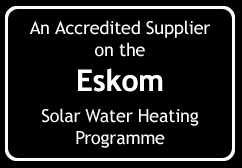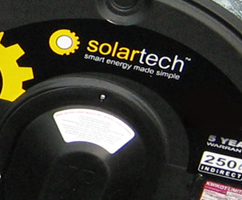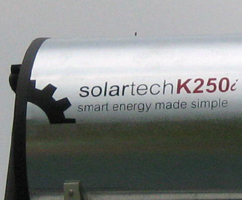

March 20th 2011 If Solar energy was fully up and running by now, it would cushion South Africans from the 25.8% electricity power hike the power utility Eskom is to introduce at the beginning of April.
The parastatal was granted the tariff increase by the National Energy Regulator of SA (Nersa) last year. Last year's hike was 24.8% and next year's will be 25.9%. The government set itself a target of amillion solar heating systems by 2014, but there are inhibiting factors in the renewable energy sector. Irvan Damon, an ambassador at the Sustainable Energy Society of Southern Africa, a non-profit organisation campaigning for the use of solar water heating and also playing a regulatory role in the sector, said SA ranked the highest in the world index of solar radiation, but because of its legacy of cheap electricity, lagged behind countries in Europe. "There is a lot that needs to be done to entrench this concept, but we are working to ensure 80% of hot water should come from solar water warming and not an electrical source." Damon said challenges included: choosing the technology (which was complicated as there were too many brands); lack of awareness campaigns to enlighten consumers; and funding hurdles. "Big finance houses and insurers should come up with accessible finance schemes that provide soft loans to consumers. We also need to create a desire in the market for solar and make the technology inspirational as a must-have for everybody. Government, big business and NGOs like us should embark on a national campaign to excite people about solar energy usage," Damon said. "The technology must be proven to be reliable and be seen as a good investment from the consumer perspective. Realistically, with the coming tariff hike, each household would be saving between R300 and R400 a month with solar energy." However, small players that want to venture into the market complain of being overlooked because of expensive approval standards set by the SA Bureau of Standards. Testing costs no less than R30000. Smaller players say this sidelines them. Dominic Goncalves, Africa energy and power research analyst at Frost & Sullivan, said the amount charged was justified judging by the returns these companies would make. He suggested that smaller players explore partnerships and franchising. The solar water heater market was growing as the number of suppliers of the technology was 400 at the start of this year, against some years ago. Goncalves said domestic water heating accounted for about 40% of a household's electricity bill. Of South Africa's national electricity consumption, 18% was allocated to the heating of water, for residential, commercial, and industrial use. The market was likely to grow as the government was expected to release new building codes soon to ensure every new building had a solar water heater or a water heater pump. He said that from 2007 to last year growth had been volatile. The market was plagued by malfunctioning products, fly-by-night firms and incorrect installation and applications. Goncalves said that a lack of skilled plumbers and installers was still a barrier. Source: http://www.timeslive.co.za |




